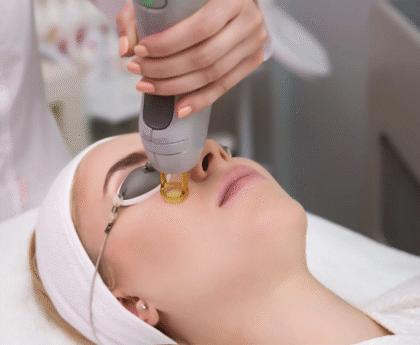Vitamin C has become one of the most celebrated ingredients in skincare, particularly for those seeking brighter, more even-toned skin. Its ability to target dark spots and hyperpigmentation has made it a staple in daily routines for many. Understanding how vitamin C works on the face can help you maximize its benefits and achieve a clearer complexion.
Understanding Dark Spots and Hyperpigmentation
Dark spots, also known as hyperpigmentation, occur when certain areas of the skin produce excess melanin. Melanin is the pigment responsible for skin color, and its overproduction can be triggered by various factors including sun exposure, hormonal changes, aging, and skin injuries.
Hyperpigmentation can appear as sunspots, post-acne marks, or uneven patches that affect the overall tone of the skin. While these spots are generally harmless, they can affect confidence and lead people to seek effective skincare solutions.
The Role of Vitamin C in Skincare
Vitamin C, or ascorbic acid, is a water-soluble antioxidant known for its skin-brightening properties. It works at a cellular level to prevent and reduce the formation of dark spots. Here’s how vitamin C benefits the skin:
Neutralizes Free Radicals
Free radicals are unstable molecules generated by sun exposure, pollution, and other environmental stressors. They damage skin cells and accelerate aging, contributing to pigmentation issues. Vitamin C for face acts as an antioxidant, neutralizing these free radicals and reducing oxidative stress on the skin.
Inhibits Melanin Production
One of the most important ways vitamin C targets dark spots is by inhibiting tyrosinase, an enzyme responsible for melanin production. By reducing tyrosinase activity, vitamin C helps slow down the formation of new dark spots and gradually lightens existing hyperpigmentation. This effect makes it one of the most sought-after ingredients in the best products for hyperpigmentation.
Boosts Collagen Synthesis
Collagen is essential for maintaining skin elasticity and smoothness. Vitamin C plays a critical role in collagen production, which helps repair damaged skin and minimize the appearance of scars and post-acne marks. This contributes to a more even skin tone over time.
Enhances Skin Barrier Function
A strong skin barrier is essential for protecting the skin from environmental aggressors that can trigger pigmentation. Vitamin C helps strengthen the skin’s barrier, allowing it to retain moisture better and stay resilient against irritants that can exacerbate dark spots.
How to Use Vitamin C for Face Effectively
To maximize the benefits of vitamin C, it’s important to understand the proper ways to incorporate it into your skincare routine.
Choosing the Right Concentration
Vitamin C serums come in different concentrations, usually ranging from 5% to 20%. Lower concentrations are suitable for sensitive skin, while higher concentrations offer more potent brightening effects but may increase the risk of irritation. For those new to vitamin C, starting with a lower concentration is recommended.
Morning or Night Application
Vitamin C can be applied both in the morning and at night, but it is particularly beneficial in the morning. Applying it during the day allows it to work alongside sunscreen to protect against UV-induced pigmentation. Always follow with a broad-spectrum sunscreen to enhance its protective effects and prevent further dark spots.
Layering with Other Ingredients
Vitamin C works well with certain ingredients such as hyaluronic acid, which helps with hydration, and ferulic acid, which enhances its stability and effectiveness. However, it’s important to avoid combining vitamin C with ingredients like retinol at the same time, as this can reduce its efficacy and increase irritation.
Consistency is Key
Visible improvements in dark spots and hyperpigmentation require consistent use over time. Typically, noticeable changes can be observed after 4 to 12 weeks of regular application, depending on the severity of pigmentation.
Common Mistakes to Avoid
Even with the best products for hyperpigmentation, improper use can limit results. Here are some common mistakes to avoid:
- Applying too much product at once, which can irritate the skin
- Using expired or unstable vitamin C formulations, which can lose effectiveness
- Neglecting sunscreen, which can reverse progress by promoting further pigmentation
- Skipping exfoliation occasionally, which can prevent vitamin C from penetrating effectively
Benefits Beyond Dark Spots
While the primary focus is often on reducing pigmentation, vitamin C for face provides additional benefits. It improves overall skin radiance, evens out skin tone, reduces fine lines, and promotes a healthy, youthful complexion. Its antioxidant properties also help minimize inflammation and redness, making it suitable for a wide range of skin types.
Tips for Maximizing Results
To get the most out of vitamin C in your routine, consider the following tips:
- Store your vitamin C serum in a cool, dark place to prevent oxidation
- Apply to clean, dry skin to ensure maximum absorption
- Introduce one new active ingredient at a time to monitor skin tolerance
- Combine with gentle exfoliation once or twice a week to remove dead skin cells
Integrating Vitamin C into a Holistic Skincare Routine
Vitamin C works best when combined with other healthy skincare habits. Using sunscreen daily, staying hydrated, maintaining a balanced diet, and avoiding excessive sun exposure all contribute to reducing dark spots and promoting overall skin health.
In addition, pairing vitamin C with other brightening ingredients like niacinamide or licorice root extract can enhance results and provide a more comprehensive approach to tackling hyperpigmentation.
Vitamin C has earned its reputation as a powerful solution for dark spots and hyperpigmentation. Its ability to neutralize free radicals, inhibit melanin production, and boost collagen makes it an essential part of any skincare routine focused on achieving a clearer, more radiant complexion.
When used correctly and consistently, vitamin C for face can significantly improve the appearance of dark spots while enhancing overall skin health. Choosing the best products for hyperpigmentation and integrating them into a thoughtful skincare routine ensures long-lasting, visible results.
With patience, proper application, and complementary skincare habits, vitamin C can transform your skin and help maintain a bright, even complexion for years to come.





